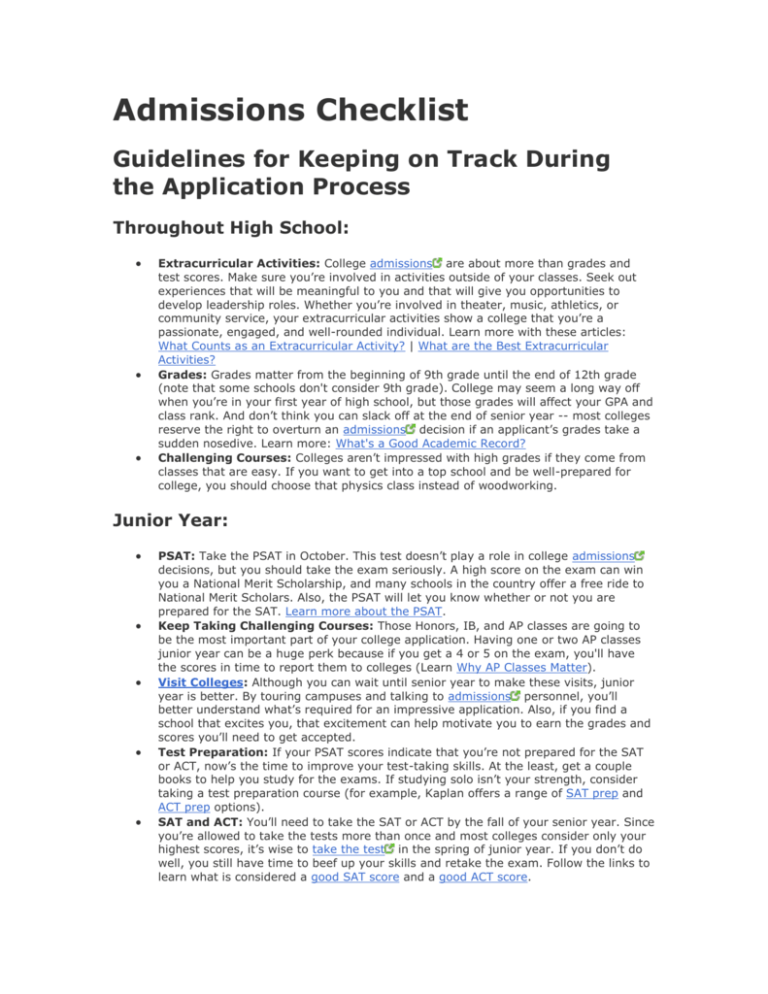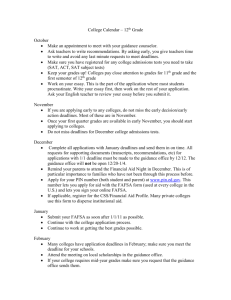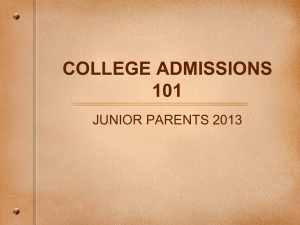Admissions Checklist
advertisement

Admissions Checklist Guidelines for Keeping on Track During the Application Process Throughout High School: Extracurricular Activities: College admissions are about more than grades and test scores. Make sure you’re involved in activities outside of your classes. Seek out experiences that will be meaningful to you and that will give you opportunities to develop leadership roles. Whether you’re involved in theater, music, athletics, or community service, your extracurricular activities show a college that you’re a passionate, engaged, and well-rounded individual. Learn more with these articles: What Counts as an Extracurricular Activity? | What are the Best Extracurricular Activities? Grades: Grades matter from the beginning of 9th grade until the end of 12th grade (note that some schools don't consider 9th grade). College may seem a long way off when you’re in your first year of high school, but those grades will affect your GPA and class rank. And don’t think you can slack off at the end of senior year -- most colleges reserve the right to overturn an admissions decision if an applicant’s grades take a sudden nosedive. Learn more: What's a Good Academic Record? Challenging Courses: Colleges aren’t impressed with high grades if they come from classes that are easy. If you want to get into a top school and be well-prepared for college, you should choose that physics class instead of woodworking. Junior Year: PSAT: Take the PSAT in October. This test doesn’t play a role in college admissions decisions, but you should take the exam seriously. A high score on the exam can win you a National Merit Scholarship, and many schools in the country offer a free ride to National Merit Scholars. Also, the PSAT will let you know whether or not you are prepared for the SAT. Learn more about the PSAT. Keep Taking Challenging Courses: Those Honors, IB, and AP classes are going to be the most important part of your college application. Having one or two AP classes junior year can be a huge perk because if you get a 4 or 5 on the exam, you'll have the scores in time to report them to colleges (Learn Why AP Classes Matter). Visit Colleges: Although you can wait until senior year to make these visits, junior year is better. By touring campuses and talking to admissions personnel, you’ll better understand what’s required for an impressive application. Also, if you find a school that excites you, that excitement can help motivate you to earn the grades and scores you’ll need to get accepted. Test Preparation: If your PSAT scores indicate that you’re not prepared for the SAT or ACT, now’s the time to improve your test-taking skills. At the least, get a couple books to help you study for the exams. If studying solo isn’t your strength, consider taking a test preparation course (for example, Kaplan offers a range of SAT prep and ACT prep options). SAT and ACT: You’ll need to take the SAT or ACT by the fall of your senior year. Since you’re allowed to take the tests more than once and most colleges consider only your highest scores, it’s wise to take the test in the spring of junior year. If you don’t do well, you still have time to beef up your skills and retake the exam. Follow the links to learn what is considered a good SAT score and a good ACT score. Senior Year: AP Courses: If your school offers AP courses, keep taking them. Senior year isn't the time to slack off. Colleges will make admissions decisions before they see your senior year AP scores, but they’ll be impressed by your challenging curriculum. Also, AP credits can give you a lot more freedom in college to take elective courses or pursue a minor or double major. Visit More Schools: Early in senior year, you’ll have to start figuring out which schools will best match your personality and interests. The more schools you visit, the better informed your choices will be. Be sure to get the most out of your campus visit. Review Colleges' Applications: Look at all of your applications early so that you know what’s required of you and so that you can start thinking about the essay questions. Realize that even if all of your colleges use the Common Application, they are likely to have supplements with unique short answer and essay questions. Getting applications requires little more than a quick visit to the admissions area of a school’s website. Admissions Essay: Don’t put off your essay until your application deadline is looming. In the summer or early in senior year, start thinking about the essay questions for the schools you’re interested in applying to. Your admissions essay should be the most thoughtful and polished piece of writing you’ve ever produced. Allow lots of time to write drafts and get feedback from teachers and counselors. Be sure to consider these tips, and check out the sample essays. For the Common Application, check out the tips and samples for the six essay options. SAT or ACT: To meet application deadlines at most competitive schools, you’ll need to have taken the SAT or ACT by early in your senior year. Also, if you took the ACT or SAT in your junior year but aren’t happy with your scores, the fall of senior year is your last chance to try again. Keep track of the SAT test dates and registration deadlines and/or the ACT test dates and deadlines. Letters of Recommendation: Your teachers and mentors are busy people, so be sure to give them plenty of time to write your letters of recommendation. Also, try to spend some time talking with your recommenders before handing them the forms -you’ll get the best letters from people who understand your interests and ambitions. Read more about getting good letters of recommendation. Submit Your Applications: The sooner you submit your applications, the better. Admissions offices tend to get overwhelmed as the application deadline nears. But don’t rush -- take time and care to make sure your application is complete and polished. College Preparation in Middle School Why Middle School Actually Does Matter For College Admissions In general, you don’t need to worry too much about college when you are in middle school. Parents who aggressively try to mold their 13-year-olds into Harvard material may do more harm than good. Nevertheless, although your middle school grades and activities won't appear on your college application, you can use seventh and eighth grades to set yourself up to have the strongest record possible in high school. This list outlines some possible strategies. 1. Work on Good Study Habits Middle school grades don't matter for college admissions , so this is a low-risk time to work on good time-management and study skills. Think about it -- if you don't learn how to be a good student until your junior year, you'll be haunted by those freshman and sophomore grades when you apply to college. 2. Explore Several Extracurricular Activities When you apply to college, you should be able to demonstrate depth and leadership in one or two extracurricular areas. Use middle school to figure out what you most enjoy –- is it music, drama, government, church, juggling, business, athletics? By figuring out your true passions in middle school, you can better focus on developing leadership skills and expertise in high school. 3. Read a Lot This advice is important for 7th through 12th grades. The more you read, the stronger your verbal, writing and critical thinking abilities will be. Reading beyond your homework will help you do well in high school, on the ACT and SAT, and in college. Whether you’re reading Harry Potter or Moby Dick, you’ll be improving your vocabulary, training your ear to recognize strong language, and introducing yourself to new ideas. 4. Work on Foreign Language Skills Most competitive colleges want to see strength in a foreign language. The earlier you build those skills, the better. Also, the more years of a language you take, the better. 5. Take Challenging Courses If you have options such as a math track that will eventually end in calculus, choose the ambitious route. When senior year rolls around, you will want to have taken the most challenging courses available at your school. The tracking for those courses often begins in middle school (or earlier). Position yourself so that you can take full advantage of whatever AP courses and upper-level math, science, and language courses your school offers. 6. Get Up to Speed If you find that your skills in an area such as math or science aren't what they should be, middle school is a wise time to seek out extra help and tutoring . If you can improve your academic strengths in middle school, you'll be positioned to earn better grades when it really begins to matter -- in 9th grade. 7. Explore and Enjoy Always keep in mind that your middle school record doesn't appear on your college application. You shouldn't stress about college in 7th or 8th grade. Your parents shouldn't stress about college either. This is not the time to be calling the admissions office at Yale. Instead, use these years to explore new things, discover what subjects and activities really excite you, and figure out any bad study habits you may have developed. College Preparation in 9th Grade 9th Grade Matters for College Admissions. Here's How to Make the Most of It. College seems a long way off in 9th grade, but you need to start thinking about it seriously now. The reason is simple -- your 9th grade academic and extracurricular record will be part of your college application. Low grades in 9th grade can seriously jeopardize your chances of getting into the country's most selective colleges The primary advice for 9th grade can be boiled down to this: take demanding courses, keep your grades up, and be active outside of the classroom. The list below outlines these points in more detail. 1. Meet With Your High School Guidance Counselor An informal meeting with your high school counselor can have many benefits in 9th grade. Use the meeting to find out what types of college admissions services your school provides, what high school courses will best help you reach your goals, and what successes your school has had in getting students admitted to selective colleges and universities. 2. Take Challenging Courses Your academic record is the most important part of your college application. Colleges want to see more than good grades; they also want to see that you have pushed yourself and taken the most challenging courses offered at your school. Set yourself up so that you can take full advantage of whatever AP and upper-level courses your school offers. 3. Focus on Grades Grades matter in your freshman year. No part of your college application carries more weight than the courses you take and the grades you earn. College may seem like it's a long way off, but bad freshman grades can hurt your chances of getting into a selective college. 4. Continue With a Foreign Language In our increasingly globalized world, colleges and universities want their applicants to have command of a foreign language. If you can keep taking a language all the way through senior year, you'll be improving your chances of admission, and you'll be giving yourself a big headstart for meeting the language requirements in college. 5. Get Help if You Need It If you find you're struggling in a subject, don't ignore the issue. You don't want your difficulties with math or a language in 9th grade to create difficulties for you later in high school. Seek out extra help and tutoring to get your skills up to snuff. 6. Extracurricular Activities By 9th grade you should be focusing on a couple extracurricular activities that you're passionate about. Colleges are looking for students with varied interests and evidence of leadership potential; your involvement in activities outside of the classroom often reveal this information to the college admissions folks. 7. Visit Colleges 9th grade is still a bit early to shop around for colleges in a serious way, but it is a good time to start seeing what types of schools strike your fancy. If you happen to find yourself near a campus, take an hour to go on the campus tour. This early exploration will make it easier to come up with a short list of colleges in your junior and senior years. 8. SAT II Subject Tests You usually don't have to worry about SAT II subject tests in 9th grade, but if you end up taking a biology or history class that covers SAT II material, consider taking the exam while the material is fresh in your mind. With the College Board's new score reporting policy, you can easily withhold a low score from colleges. 9. Read a Lot This advice is important for 7th through 12th grades. The more you read, the stronger your verbal, writing and critical thinking abilities will be. Reading beyond your homework will help you do well in school, on the ACT and SAT, and in college. Whether you’re reading Sports Illustrated or War and Peace, you’ll be improving your vocabulary, training your ear to recognize strong language, and introducing yourself to new ideas. 10. Don't Blow Off Your Summer While it may be tempting to spend your whole summer sitting by the pool, try to do something more productive. Summer is a great opportunity to have meaningful experiences that will be rewarding for you and impressive on your college application. Travel, community service, volunteerism, sports or music camp, and employment are all good options. College Preparation in 10th Grade Use Sophomore Year to Create a Winning College Admissions Strategy Your college applications are still a couple years off when you start 10th grade, but you need to keep your long-term goals in mind. Work on keeping your grades up, taking challenging courses, and gaining depth in your extracurricular activities. Below are ten things to think about in 10th grade: 1. Continue to Take Challenging Courses An "A" in AP Biology is more impressive than an "A" in gym or shop. Your success in challenging academic courses provides the college admissions folks with the best evidence of your ability to succeed in college. In fact, many admissions officers will strip out your less meaningful grades when they calculate your high school GPA. 2. Grades, Grades, Grades Throughout high school, nothing matters more than your academic record. If you're aiming for a highly selective college, every low grade you earn might be limiting your options (but don't panic -- students with the occasional "C" still have plenty of options). Work on self- discipline and time management in an effort to earn the highest grades possible. 3. Put Effort Into Extracurricular Activities By the time you apply to colleges , you should be able to demonstrate depth and leadership in an extracurricular area. Colleges will be more impressed with the applicant who played firstchair clarinet in the All-State Band than the applicant who took a year of music, a year of dance, three months of chess club and a weekend volunteering at a soup kitchen. Think about what it is that you'll bring to a college community. A long but shallow list of extracurricular involvement really doesn't amount to anything meaningful. 4. Continue Studying a Foreign Language Colleges will be much more impressed by students who can read Madame Bovary in French than those who have a shallow smattering of "bonjours" and "mercis." Depth in a single language is a better choice than introductory courses to two or three languages. Be sure to read more about college admissions language requirements. 5. Take a Trial Run of the PSAT This is entirely optional, but if your school allows it, you should consider taking the PSAT in October of 10th grade. The consequences of doing poorly are zero, and the practice can help you figure out what type of preparation you need before PSAT and SAT time in your junior and senior years. The PSAT won't be part of your college application, but be sure to read why the PSAT matters. If you're planning on the ACT instead of the SAT, ask your school about taking the PLAN. 6. Take SAT II and AP Exams as Appropriate You're more likely to take these exams in your junior and senior years, but more and more students are taking them earlier, especially as high schools increase their AP offerings. It's worth studying for these exams -- many colleges require a couple SAT II scores, and a 4 or 5 on an AP exam can earn you course credit and give you more options in college. 7. Familiarize Yourself with the Common Application Look over the common application so that you know exactly what information you're going to need when you apply to colleges . You don't want senior year to roll around and only then discover that you have gaping holes in your high school record. 8. Visit Colleges and Browse the Web Your sophomore year is a good time to do some low-pressure exploration of the college options out there. If you find yourself near a campus, stop by and take the tour. If you have more than an hour, follow these college visit tips to get the most out of your time on campus. Also, lots of schools offer informative virtual tours on their websites. This preliminary research will help you make good decisions in your junior and senior years. 9. Keep Reading This is good advice for any grade. The more you read, the stronger your verbal, writing and critical thinking abilities will be. Reading beyond your homework will help you do well in school, on the ACT and SAT, and in college. You’ll be improving your vocabulary, training your ear to recognize strong language, and introducing yourself to new ideas. 10. Have a Summer Plan There's no formula for what defines a productive summer, but you should make sure you do something that leads to personal growth and valuable experiences. The options are many: volunteer work, a summer music program at a local college, a bike tour down the West Coast, apprenticing with a local politician, living with a host family abroad, working in the family busines... Whatever your passions and interests, try to plan your summer to tap into them. College Preparation in 11th Grade Use Sophomore Year to Create a Winning College Admissions Strategy In 11th grade, the college preparation process accelerates and you need to start paying careful attention to looming deadlines and application requirements. Realize that in 11th grade you don't need to choose exactly where to apply yet, but you do need to have a plan mapped out for achieving your broad educational goals. The 10 items in the list below will help you keep track of what's important for college admissions in your junior year. 1. In October, Take the PSAT Colleges won't see your PSAT scores, but a good score on the exam can translate into thousands of dollars. Also, the exam will give you a good sense of your preparedness for the SAT. Take a look at some college profiles and see if your PSAT scores are in line with the SAT ranges listed for the schools you like. If not, you still have plenty of time to improve your testtaking skills. Be sure to read more about why the PSAT matters. Even students who don't plan on taking the SAT should take the PSAT because of the scholarship opportunities it creates. 2. Take Advantage of AP and Other Upper-Level Course Offerings No piece of your college application carries more weight than your academic record. If you can take AP courses in 11th grade, do so. If you can take a course at a local college, do so. If you can study a subject in greater depth than what's required, do so. Your success in upper- level and college-level courses is a clear indicator that you have the skills to succeed in college. 3. Keep Your Grades Up 11th grade is probably your most important year for earning high grades in challenging courses. If you had a few marginal grades in 9th or 10th grade, improvement in 11th grade shows a college that you've learned how to be a good student. Many of your senior year grades come too late to play a big role on your application, so junior year is essential. A drop in your grades in 11th grade shows a move in the wrong direction, and it will raise red flags for the college admissions folks. 4. Keep Going With a Foreign Language If you find language study frustrating or difficult, it's tempting to give up on it and shop around for other classes. Don't. Not only will mastery of a language serve you well in your life, but it will also impress the college admissions folks and open up more options for you when you eventually get to college. Be sure to read more about language requirements for college applicants. 5. Assume a Leadership Role in an Extracurricular Activity Colleges like to see that you're a band section leader, a team captain or an event organizer. Realize that you don't need to be a prodigy to be a leader -- a second-string football player or third-chair trumpet player can be a leader in fundraising or community outreach. Think about ways that you can contribute to your organization or community. Colleges are looking for future leaders, not passive bystanders. 6. In the Spring, take the SAT and/or ACT Keep track of SAT registration deadlines and test dates (and ACT dates). While not essential, it's a good idea to take the SAT or ACT in your junior year. If you don't get good scores, you can spend some time in the summer building your skills before retaking the exam in the fall. Colleges consider only your highest scores. 7. Visit Colleges and Browse the Web By the summer of your junior year, you want to begin hammering out the list of colleges to which you'll apply. Take advantage of every opportunity to visit a college campus. Browse the web to learn more about different types of colleges. Read through the brochures you receive in the spring after taking the PSAT. Try to figure out if your personality is better suited for a small college or large university. 8. In the Spring, Meet with Your Counselor and Draft a College List Once you have some junior year grades and your PSAT scores, you'll be able to start predicting which colleges and universities will be reach schools, match schools and safety schools. Look over the college profiles to see average acceptance rates and SAT/ACT score ranges. For now, a list of 15 or 20 schools is a good starting point. You'll want to narrow down the list before you begin applying in senior year. Meet with your guidance counselor to get feedback and suggestions on your list. 9. Take SAT II and AP Exams as Appropriate If you can take AP exams in your junior year, they can be a huge plus on your college application. Any 4s and 5s you earn show you are truly ready for college. Senior year APs are great for earning college credits , but they come too late to show up on your college application. Also, a lot of the more competitive colleges require a couple SAT II subject tests. Take these soon after your coursework so that the material is fresh in your mind. 10. Make the Most of Your Summer You'll want to visit colleges in the summer, but don't make that your entire summer plan (for one, it's not something that you can put on your college applications). Whatever your interests and passions, try to do something rewarding that taps into them. A well-spent junior summer can take many forms -- employment, volunteer work, travel, summer programs at colleges , sports or music camp... If your summer plans introduce you to new experiences and make you challenge yourself, you've planned well. Month-by-Month Senior Year College Application Timeline Keep Track of Important Dates and Deadlines in 12th Grade Senior year is a busy and extremely important time in the college admissions process. This is your last chance to get the ACT and SAT scores you need, and senior year is when you have to narrow down your college options to the handful of schools to which you’ll apply. You’ll need to get your college essay up to snuff, line up your letters of recommendation, and apply for financial aid. During the application process, you'll need to keep active in extracurricular activities and maintain high grades. August before Senior Year Register for the September ACT if appropriate (check ACT dates). Come up with a preliminary list of colleges that includes reach, match and safety schools. Explore the websites of the colleges that interest you to learn about admissions requirements. Check your senior year class schedule to make sure you're taking the English, Math, Social Science, Science, and Foreign Language classes you'll need for your top-choice colleges. Look over the Common Application and begin thinking about potential topics for your personal essay. Visit campuses and interview with college representatives if appropriate. September Register for October or November SAT and SAT Subject exams (check SAT dates). Meet with your guidance counselor to discuss the colleges to which you're thinking of applying. Request letters of recommendation, especially if you are applying early. Continue to visit campuses and interview with college admissions representatives. Request applications from all the schools to which you might apply. Create an account with The Common Application if the colleges you've selcted use it. Create a chart of deadlines. Pay particular attention to early decision, early action, and preferred application deadlines. If appropriate, register for the October ACT exam. Work on your college essays. Try to assume a leadership position in an extracurricular activity. Work to strengthen your academic record. October Take the SAT, SAT Subject exams, and/or ACT as appropriate. Continue to research schools to narrow your list to roughly 6 - 8 schools. Take advantage of college fairs and virtual tours. Complete your applications if you are applying early decision or early action. Research financial aid and scholarships. Do your parents' places of employment offer college scholarships for employee children? Get your college essay in shape. Get feedback on your writing from a guidance counselor and a teacher. Request your high school transcript and check it for accuracy. Keep track of all application components and deadlines: applications, test scores, letters of recommendation, and financial aid materials. An incomplete application will ruin your chances for admission. November Register for the December SAT or ACT if appropriate. Take the November SAT if appropriate. Don't let your grades slide. It's easy to be distracted from school work when working on applications. Senior slump can be disastrous for your admissions chances. Make sure you've submitted all components of your applications if you are applying to colleges with November deadlines for early decision or preferred application. Put the final touches on your application essays, and get feedback on your essays from counselors and/or teachers. Continue to research scholarships. December - January Complete your applications for regular admissions . Make sure you've had your test scores sent to all colleges that require them. Confirm that your letters of recommendation have been sent. Submit the FAFSA (Free Application for Financial Aid). If you are accepted to a school through early decision, be sure to follow directions carefully. Submit required forms, and notify the other schools to which you applied of your decision. Continue to focus on your grades and extracurricular involvement. Have midyear grades sent to colleges. Continue to keep track of all deadlines and application components. Continue to research scholarships. Apply for scholarships well in advance of deadlines. February - March If you submitted the FAFSA, you should receive the Student Aid Report (SAR). Carefully look it over for accuracy. Errors can cost you thousands of dollars. Contact colleges that didn't send you a confirmation receipt for your application. Don't put off applying to schools with rolling admissions or late deadlines -- the available spaces can fill up. Talk to your school about registering for AP exams. Keep your grades high. Colleges can revoke offers of admission if your grades take a nosedive senior year. Some acceptance letters may arrive. Compare financial aid offers and visit campus before making a decision. Don't panic; many, many decisions are not mailed out until April. Continue applying for appropriate scholarships. April Keep track of all acceptances, rejections, and waitlists. If waitlisted, learn more about waitlists and move ahead with other plans. You can always change your plans if you get off a waitlist. Keep your grades up. If you have ruled out any colleges that accepted you, notify them. This is a courtesy to other applicants, and it will help the colleges manage their waitlists and extend the correct number of acceptance letters. Go to accepted student open houses if offered. A couple circumstances may warrant an appeal of a college rejection May - June Avoid senioritis! An acceptance letter doesn't mean you can stop working. Most schools have a deposit deadline of May 1st. Don't be late! If needed, you may be able to request an extension. Prepare for and take any appropriate AP exams. Most colleges offer course credit for high AP scores; this gives you more academic options when you get to college. Have your final transcripts sent to colleges . Send thank you letters to everyone who helped you in the application process. Let your mentors and recommenders know the results of your college search. Keep on top of procuring student loans. Notify your college if you receive any scholarships. Graduate. Congratulations! July - August after Senior Year Read all mailings from your college carefully. Often important registration and housing material is sent in the summer. Register for your classes as soon as possible. Classes often fill, and registration is usually on a first-come, first-served basis. If you get your housing assignment, take advantage of the summer to get to know your roommate (email, facebook, the phone, etc). Figure out who will bring what. You don't need two TVs and two microwaves in your tiny room.








